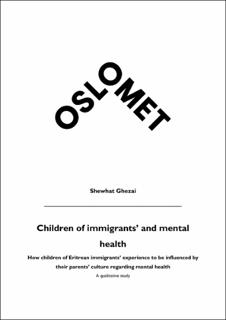| dc.description.abstract | Eritrea’s 30 yearlong liberation war affected a whole generation that is now a generation of parents. The adult children of these parents, signify a group in the Norwegian population, with currently little empirical data. This qualitative phenomenological study explores the experiences and reflections of the children of Eritrean immigrants raised in Norway and their relation to mental health. It aims to explore their experience of being influenced by their parent's culture and the Eritrean culture, regarding how they express emotions and talk about mental health. The purpose is to reduce stigma, increase knowledge within the Eritrean community, and minimize a knowledge gap for future policymakers designed for the diverse population. The results may contribute to reduce the space between policymakers and consumers while increasing a culturally sensitive approach.
Thirteen interviews were conducted with people between the age of 20 and 45, whereas nine were transcribed and analyzed according to Malterud’s systematic text condensation (STC).
The analyses found that the adult children of Eritrean immigrants are in a complex position between two societies that heavily influence their lived lives. The search for belonging and representation, the desire to make good of their parents’ sacrifice, the experienced effect of ethnicity, and the decisive past of Eritrea have proved to affect the participant's relation to mental health. The silence of the participants’ challenges is evident. Many speak of endurance and resilience, but it is questioned if this is misunderstood and a comforting explanation for the distance and silence experienced.
This study is based on an inductive approach, where the research and literature used are based on the findings that emerged. The results are discussed with the terms stigma, endurance, resilience, history, and postmemory. | en_US |
